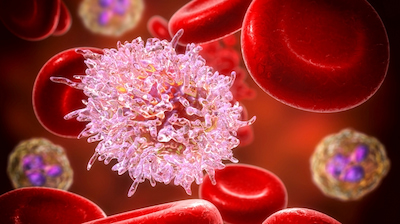PBAC to consider three lymphoma drugs
Brentuximab vedotin (Adcetris®) received a positive recommendation from the Pharmaceutical Benefits Advisory Committee (PBAC) at its last meeting, and the PBAC will consider three lymphoma drugs at its next meeting in July.
Positive recommendation for brentuximab vedotin
The Leukaemia Foundation provided consumer comments for the PBAC’s March meeting, including for Takeda’s submission for brentuximab vedotin as a first-line treatment of CD30 positive peripheral T-cell lymphoma (PTCL).
The Leukaemia Foundation’s Head of Policy and Advocacy, Emily Forrest, said that, “depending on negotiations between the Government and the sponsor, Takeda, it can take six months or more from a positive PBAC recommendation to the product being listed on the Pharmaceutical Benefits Scheme (PBS)”.

Submissions for acalabrutinib, selinexor, and zanubrutinib
For consideration at the PBAC’s July 2021 meeting, the Leukaemia Foundation provided consumer comments for several products targeted at lymphoma, including for acalabrutinib (Calquence®), selinexor (Xpovio®), and zanubrutinib (Brukinsa®)
These consumer comments were based on feedback from people living with blood cancer, their families and caregivers through its database and Facebook pages, direct clinician experience, and results from relevant clinical trials.
Acalabrutinib for R/R MCL
One related to the AstraZeneca submission for acalabrutinib (Calquence®), for patients with relapsed/refractory mantle cell lymphoma (MCL) who had received at least one prior therapy or who had developed an intolerance to another Bruton’s tyrosine kinase (BTK) inhibitor.
“We understand the current standard of care for patients with relapsed/refractory MCL is treatment with a BTK inhibitor,” said Ms Forrest.
“For patients who develop an intolerance to existing approved BTK inhibitors treatment options are limited.
“Acalabrutinib represents an alternative treatment option for these patients and is recommended as an alternative treatment by the National Comprehensive Cancer Network in their Clinical Practice Guidelines for Non-Hodgkin lymphoma,” she said.
“We also understand acalabrutinib is well tolerated by patients and is associated with a lower risk of serious adverse events than its main comparator.
“This could be particularly beneficial in patients already at risk of cardiac and haematologic adverse events, and lower risk of adverse events overall may allow patients to continue treatment for longer with less side effects.”
Selinexor for R/R DLBCL
The Leukaemia Foundation also provided consumer comments in relation to Antengene’s submission for selinexor for the treatment of relapsed and/or refractory diffuse large B-cell lymphoma (DLBCL) in patients who have received at least two lines of systemic therapy.
These patients are typically clinically complex, with multiple indications such as age, comorbidities, long treatment history, and other factors that may make them unsuitable for intensive or cytotoxic therapies. And this contributes to a poor prognosis for DLBCL which is aggressive and difficult to treat,” said Ms Forrest.
“For patients who have failed two previous therapies and who are not candidates for autologous stem cell transplant or CAR T-cell therapies, there are currently few other options for treatment.”
The sponsor (Antengene) provided information on the SADAL study, which noted positive outcomes for many of its patients who otherwise would have no treatment options beyond best supportive care, with a tolerable safety profile. Three patients experienced sufficient reduction in disease burden to enable them to undergo CAR T-cell therapy, which was not previously a treatment option for them. Unlike cytotoxic therapies, we understand selinexor can be continued indefinitely by patients while there is adequate disease control.
“Selinexor is a relatively new class of novel therapy; its manageable safety profile is especially relevant for patients who cannot tolerate other classes of therapies.
“Advances in therapies such as selinexor, which can provide a treatment option for relapsed/refractory DLBCL patients unsuitable for other therapies, should be a priority for consideration by the PBAC.
Given the high unmet need for therapies, the acceptable safety profile of this therapy and the evidence of overall survival benefit, the Leukaemia Foundation’s submission urged the PBAC to recommend that this treatment is listed on the PBS for eligible patients.”
Zanubrutinib for WM
The Leukaemia Foundation provided comments in support of BeiGene’s submission to the PBAC for zanubrutinib (Brukinsa®) to treat adults with Waldenström’s macroglobulinaemia (WM).
The Leukaemia Foundation also suggested the PBAC engage directly with WMozzies, a non-profit patient support group regarding consumer input.
To understand the safety profile and patient experience of this therapy, the Leukaemia Foundation spoke to a Sydney-based clinician who had treated patients with zanubrutinib under clinical trial conditions.
“They noted that, in their experience, zanubrutinib was effective and well tolerated, with very few side effects in their patients, and observed a lower bleeding risk than other treatments in their patients,” said Ms Forrest.
We understand, based on available evidence, that zanubrutinib was tolerable and effective in patients who discontinued other treatments due to adverse events, and these adverse effects were unlikely to recur while being treated with zanubrutinib.
Overall, zanubrutinib may provide a therapeutic option for patients who are intolerant to other BTK inhibitors.
Given the high unmet need for therapies for patients with WM and particularly wild-type MYD88 WM, the acceptable safety profile of this therapy and the evidence of overall survival benefit, the Leukaemia Foundation’s submission urged the PBAC to recommend that this treatment is listed on the PBS for eligible patients.
Last updated on June 8th, 2022
Developed by the Leukaemia Foundation in consultation with people living with a blood cancer, Leukaemia Foundation support staff, haematology nursing staff and/or Australian clinical haematologists. This content is provided for information purposes only and we urge you to always seek advice from a registered health care professional for diagnosis, treatment and answers to your medical questions, including the suitability of a particular therapy, service, product or treatment in your circumstances. The Leukaemia Foundation shall not bear any liability for any person relying on the materials contained on this website.